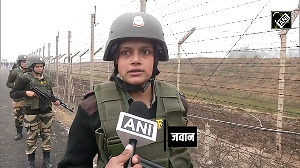The word 'consultation' can have only one meaning, be it Gujarat judgement, Karnataka judgement or any other judgement in rest of the country, notes Arun Jaitley.
The Supreme Court on January 11, 2013, has delivered the judgement in the Karnataka Upa Lokayukta case. I had made a detailed comment on January 3 on another judgement of the Supreme Court delivered on January 2, on the subject mater of appointment of Lokayukta in Gujarat.
I have read and re-read the two judgements delivered nine days apart from each other. The law declared by the Supreme Court in both the judgements appears to be significantly different; leaving many in doubt with regard to the primacy of the chief justice's opinion delivered in the appointment of Gujarat Lokayukta.
The provisions
Section 3 of the Karnataka Act deals with the appointment of Lokayukta and Up-Lokayukta. Section 3 (2)(b) of the said act reads as under:-
"(b) A person to be appointed as an Upa-lokayukta shall be a person who has held the office of the Judge of a High Court and shall be appointed on the advice tendered by the Chief Minister in consultation with Chief Justice of the High Court of Karnataka, the Chairman, Karnataka Legislative Council, the Speaker, Karnataka Legislative Assembly, the Leader of the opposition in the Karnataka Legislative Council and the Leader of opposition in the Karnataka Legislative Assembly."
The provision (section 3) as contained in the Gujarat Act reads as under:
"For the purpose of conducting investigations in accordance with provisions of this Act, the Governor shall, by warrant under his hand and seal, appoint a person to be known as the Lokayukta.
Provided that the Lokayukta shall be appointed after consultation with the Chief Justice of the High Court and except where such appointment is to be made at a time when the Legislative Assembly of the State of Gujarat has been dissolved or a Proclamation under Article 356 of the Constitution is in operation in the State of Gujarat, after consultation also with the Leader of Opposition in the Legislative Assembly, or if there be no such Leader, a person elected in this behalf by the members of the Opposition in that House in such manner as the Speaker may direct."
A reading of the provisions of the Karnataka Act leads to an irresistible conclusion that the person to be appointed as Upa Lokayukta in Karnataka should have held the office of a Judge of a High Court, and shall be appointed on the advice tendered by the chief minister to the governor.
Before tendering the advice the chief minister must consult the chief justice of the high court and the chairman of the Karnataka legislative council, the speaker of the legislative assembly, the leader of the opposition in the Karnataka legislative council and the leader of opposition in the Karnataka legislative assembly. The material words used in this section is 'consultation'.
The procedure mentioned in the Gujarat Act is that the appointment is made under the seal of the governor. The governor, as rightly held by the Supreme Court, will act on the aid and advice of the council of ministers. The chief minister/council of ministers will consult the chief justice of the high court and the leader of opposition. The material word used in the Gujarat
Act also is 'consultation'.
The issue is whether the word 'consultation' in the Karnataka Act can mean differently from the same word used in the Gujarat Act. The Karnataka judgement restores the balance between the executive and the judiciary. It follows the golden rule of interpretation i.e. the literal interpretation which clearly expresses the intention of the legislature.
The Karnataka view
The Supreme Court in the Karnataka judgement has rightly opined that the consultation must be meaningful and effective. The names which the chief minister desires to recommend to the governor must be referred to all the consultees. The two concurring opinions of the Supreme Court in the Karnataka case give the following rationale:-
"The advice tendered by the chief minister will have primacy and not that of the consultees including the chief justice of the high court"
In my view that this the scheme of Section 3(2)(a) and (b) of the act and however, much we strain, nothing spells out from the language used in section 3(2)(a) and (b) to hold that primacy be attached to the opinion expressed by the chief justice of the high court of Karnataka. I am, therefore, of the view that the various directions given by the high court holding that the views of the chief justice has got primacy, is beyond the scope of the act and the high court has indulged in a legislative exercise which is impermissible in law.
I, however, make it clear that there is no primacy in the views expressed by any of the consultees and after due deliberations of the names suggested by the consultees including the name if any suggested by the chief minister, the chief minister can advise any name from the names discussed to the governor of the state for appointment of Upa Lokayukta under the Act."
The concurring second opinion of the Supreme Court similarly reads as under:-
"Ordinarily, it must be the Chief Minister since he has to tender advice to the Governor and in a sense the appointment is his primary responsibility.. It must not be forgotten that the creation of the Upa Lokayukta is a consultation process involving several constitutional authorities and in the context of the Act no constitutional authority is subordinate to the other...
I am, therefore, in agreement with the High Court that the recommendation for appointing the Upa Lokayuta under the Act must emanate only from the Chief Minister and only the recommended by him should be considered. As far as section 3 (2)(b) of the Act is concerned the primary responsibility for appointment of the Upa Lokayukta rests with the Chief Minister who has to advise the Governor. Since the Chief Justice is not the only constitutional authority required to be consulted by the Chief Minister before his advice is tendered to the Governor, it cannot be said that ony his views will prevail over other constitutional authorities..."
The judgement of the Supreme Court in the Karnataka's case while upholding that there must be meaningful consultation with various consultees including the chief justice, gives primacy to the chief minister and not the chief justice of the high court.
The Gujarat view
In the Gujarat Lokayukta case the opinion of the Supreme Court is completely at variance. The Supreme Court has held that -- "The purpose of giving primacy to the opinion of the Chief Justice is for the reason that he enjoys an independent status and also because person eligible to be appointed as Lokayukta is from amongst the retired judges of the High Court and the Chief Justice is, therefore, the best person to judge his suitability... As the Chief Justice has primacy in the appointment in the said matter, the non-acceptance of his recommendation by the Chief Minister remains insignificant... Aditionally, a person possessing limited power (a chief minister!) cannot be permitted to exercise unlimited power."
The contradiction
Within a period of nine days two clearly conflicting opinions on the appointment of Lokayukta and Upa Lokayukta have been expressed by the Supreme Court. How can the law in Gujarat be different than the law in any other state.
The reasoning given in the latter judgement that the scheme of the two acts is different, does not appear to be sound as both the acts contemplate consultation by the chief minister with various consultees including the chief justice of the high court. Much to the contrary, the scheme of both the acts is almost identical.
Two diametrically opposite views leaves me as a Legislator in doubt. On a future date, if the Parliament provides for a collegium to appoint the Lokpal will the chief justice be merely a consultee and a participant or will his opinion have primacy and be binding on the other members of the collegium. This ambiguity requires to be removed and clarity introduced in the interpretation process.
To give a word a different meaning even when the context are similar has no precedent in history. A majority in the House of Lords during the Second World War preventive detention case gave a different interpretation to the satisfaction of the secretary of the state in detaining Nazi spies from the interpretation that it gave during peace times. In what was one of the greatest dissents in legal history, Lord Atkin in Liversidge vs. Sir John Anderson dissented. I can only reproduce his momentous words -- "In this country amidst the clash of arms the laws are not silent. They may be changed, but they speak the same language in war as in peace... I protest, even if I do it alone, against a strained construction put upon words with the effect of giving an uncontrolled power of imprisonment to the Minister. To recapitulate. The words have only one meaning; they are used with that meaning in statements of the common law and in statutes; they have never been used in the sense now imputed to them; they are used in the defence regulations in the natural meaning; arid when it is intended to express the meaning now imputed to them, different arid apt words are used in the defence regulations generally and in this regulation in particular. Even if it were relevant, which it is not, there is no absurdity or no such degree of pubic mischief as woulf lead to a non-natural construction. I know of only one authority which might justify the suggested method of construction. "When I use a word, "Humpty Dumpty said in a rather scornful tone, "it means just what I choose it to "mean, neither more or less." "The question is," said Alice, "whether you can make words mean different things." "The question is," said Humpty Dumpty, "which is to be master --"that's all".
The word 'consultation' can have only one meaning, be it Gujarat, Karnataka or the rest of the country.
The author is a noted lawyer and the leader of opposition in the Rajya Sabha.










 © 2024 Rediff.com -
© 2024 Rediff.com -